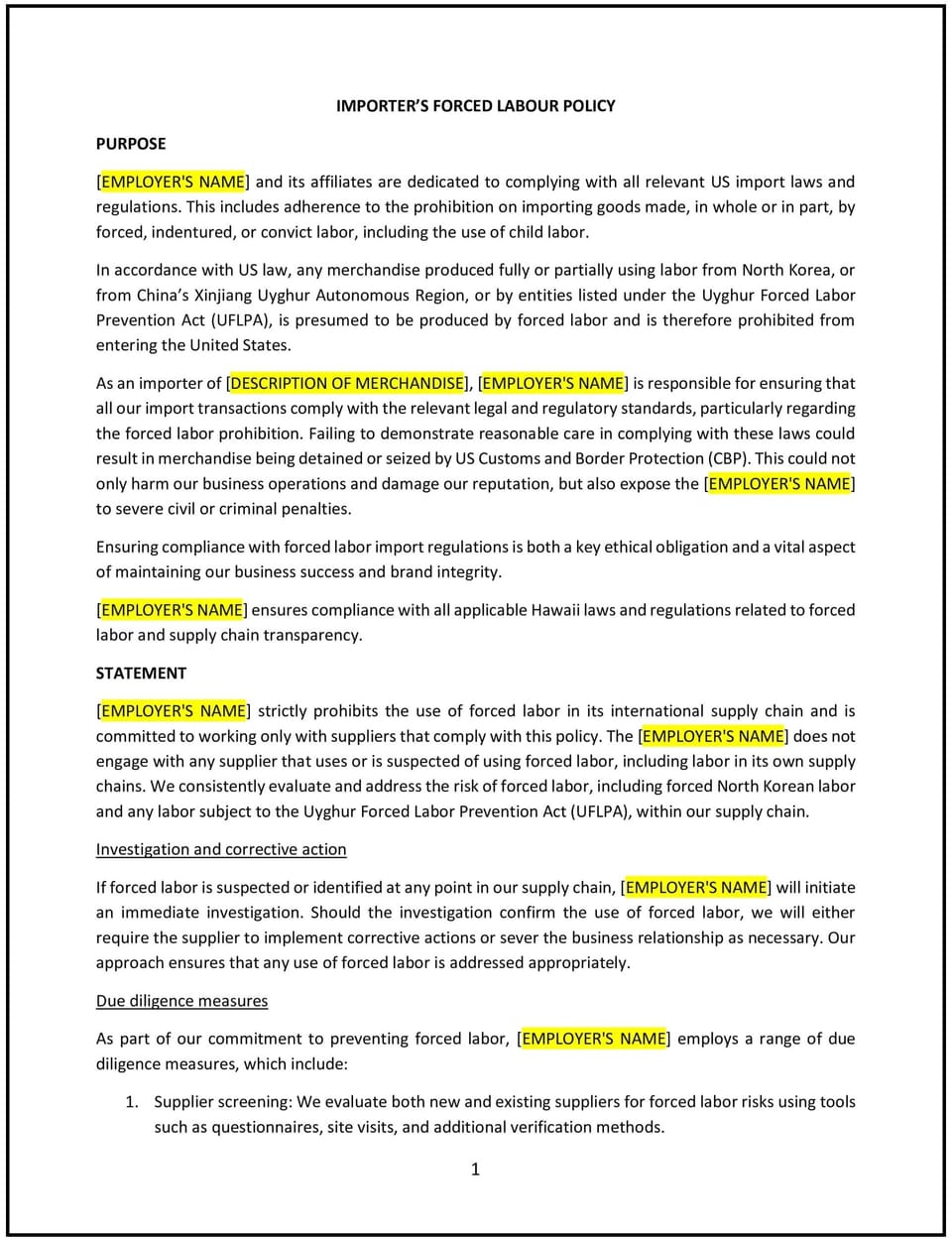Importer's forced labour policy (Hawaiʻi): Free template

Importer’s forced labor policy (Hawaiʻi)
An importer’s forced labor policy helps Hawaiʻi businesses establish guidelines for ensuring that goods and materials sourced from international suppliers are produced without the use of forced labor. This policy outlines procedures for assessing supply chain risks, conducting due diligence, and addressing potential violations, while aligning with federal laws such as the U.S. Tariff Act and international standards. Tailored to Hawaiʻi’s unique position as a hub for international trade, this policy is designed to promote ethical sourcing, protect human rights, and maintain the integrity of the business’s supply chain.
By implementing this policy, businesses in Hawaiʻi can demonstrate their commitment to ethical practices, reduce legal and reputational risks, and contribute to global efforts to eliminate forced labor.
How to use this importer’s forced labor policy (Hawaiʻi)
- Define forced labor: Provide a clear definition of forced labor, including examples such as coercion, debt bondage, or human trafficking, to ensure understanding across the organization.
- Assess supply chain risks: Identify high-risk regions, industries, or suppliers where forced labor is more likely to occur and prioritize due diligence efforts.
- Conduct due diligence: Establish procedures for evaluating suppliers, such as audits, certifications, or third-party assessments, to verify compliance with forced labor laws.
- Address violations: Outline steps for addressing potential violations, including terminating contracts with non-compliant suppliers and reporting issues to relevant authorities.
- Communicate the policy: Share the policy with employees, suppliers, and stakeholders to ensure awareness and commitment to ethical sourcing practices.
- Train employees: Educate staff on the policy’s guidelines, including how to identify and report potential forced labor risks in the supply chain.
- Monitor compliance: Regularly review supply chain practices to ensure adherence to the policy and address any issues promptly.
- Review and update the policy: Regularly assess the policy’s effectiveness and make adjustments as needed to reflect changes in laws, supply chain dynamics, or business needs.
Benefits of using this importer’s forced labor policy (Hawaiʻi)
This policy offers several advantages for Hawaiʻi businesses:
- Promotes ethical sourcing: A clear policy demonstrates the business’s commitment to sourcing goods and materials responsibly.
- Reduces legal risks: Adhering to federal laws such as the U.S. Tariff Act minimizes the risk of fines, penalties, or import bans.
- Protects human rights: By addressing forced labor risks, businesses contribute to global efforts to eliminate exploitation and protect workers’ rights.
- Enhances reputation: Demonstrating a commitment to ethical practices improves the business’s reputation among customers, partners, and stakeholders.
- Supports supply chain integrity: A transparent and ethical supply chain fosters trust and long-term relationships with suppliers and customers.
- Aligns with international standards: The policy helps businesses comply with global initiatives, such as the International Labour Organization (ILO) standards.
- Encourages accountability: Clear guidelines ensure employees and suppliers understand their responsibilities for preventing forced labor.
Tips for using this importer’s forced labor policy (Hawaiʻi)
- Communicate the policy effectively: Share the policy with employees, suppliers, and stakeholders to ensure awareness and commitment to ethical sourcing practices.
- Provide training: Educate staff on the policy’s guidelines, including how to identify and report potential forced labor risks in the supply chain.
- Be proactive: Regularly assess supply chain risks and conduct due diligence to address potential issues before they escalate.
- Encourage transparency: Work with suppliers to promote transparency and accountability in their labor practices.
- Monitor compliance: Regularly review supply chain practices to ensure adherence to the policy and address any issues promptly.
- Be transparent: Clearly explain the policy’s purpose, benefits, and expectations to employees and suppliers to build trust and cooperation.
- Review the policy periodically: Update the policy as needed to reflect changes in laws, supply chain dynamics, or business needs.
Q: Why should Hawaiʻi businesses adopt an importer’s forced labor policy?
A: Businesses should adopt this policy to promote ethical sourcing, reduce legal and reputational risks, and contribute to global efforts to eliminate forced labor.
Q: What is forced labor?
A: Forced labor includes any work or service that is exacted from a person under threat, coercion, or penalty, such as human trafficking or debt bondage.
Q: How should businesses assess supply chain risks?
A: Businesses should identify high-risk regions, industries, or suppliers and prioritize due diligence efforts, such as audits or third-party assessments.
Q: What steps should businesses take if forced labor is found in the supply chain?
A: Businesses should address violations by terminating contracts with non-compliant suppliers, reporting issues to authorities, and implementing corrective actions.
Q: What training should businesses provide to employees?
A: Businesses should educate staff on the policy’s guidelines, including how to identify and report potential forced labor risks in the supply chain.
Q: How can businesses ensure compliance with the policy?
A: Businesses should regularly review supply chain practices, conduct due diligence, and work with suppliers to promote transparency and accountability.
Q: How often should the policy be reviewed?
A: The policy should be reviewed annually or as needed to reflect changes in laws, supply chain dynamics, or business needs.
This article contains general legal information and does not contain legal advice. Cobrief is not a law firm or a substitute for an attorney or law firm. The law is complex and changes often. For legal advice, please ask a lawyer.


